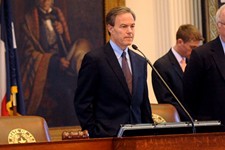
Dark Money
2018, NR, 99 min. Directed by Kimberly Reed.
REVIEWED By Marjorie Baumgarten, Fri., Aug. 3, 2018
Even though this documentary is pitched as a “political thriller,” there’s an inherent challenge in shaping the topic of campaign finance law into exciting film subject matter. And while Dark Money largely succeeds in this mission, uneven storytelling sometimes deflects the film’s impact. Nevertheless, since the Supreme Court handed down the Citizens United decision in 2010 (which ruled that political spending is a form of free speech protected under the First Amendment and that corporations and unions are permitted to spend unlimited amounts of money to support candidates, provided the funds are technically independent of the campaigns themselves), the subject of campaign finance law has never been more inflammatory and urgent.
“Campaign finance is like the gateway issue to every other issue that you might care about – whether it be education or tax reform or foreign policy,” says Ann M. Ravel, the former chairwoman of the Federal Election Commission and one of this film’s more inspiring and succinct speakers. Ravel is indicative of some of the federal policy wonks and organizations dedicated to overthrowing the Citizens United decision. Yet director Kimberly Reed makes a shrewd choice to center her film in the state of Montana. Although the state’s sparse population would make it seem like an unlikely testing ground for campaign-finance reform, there are fascinating historical reasons to examine the fight there. In 1912, Montana passed the Corrupt Practices Act, which prohibited the so-called Copper Kings and other corporate powerhouses and mining barons from buying state legislators as they had done previously in the 1894 state elections. With the Corrupt Practices Act already on the state’s books, Montana was in a unique position to challenge the imposition of the new contrary federal guidelines wrought by the Citizens United decision.
Dark Money opens with accounts from several Montana candidates who were targeted by dark-money interests. For example: Campaign advertising flooded voters’ mailboxes with cards blasting a sensationalistic reference to John Wayne Gacy, "the Killer Clown,” pedophile rapist, and murderer, and how the candidate in question, John Ward, “believes that monsters like this deserve to live.” A group with the innocuous name of Mothers Against Child Predators was listed as the sender of the flyers: However, the group was merely a front for a deep-pocketed super PAC that didn’t have to identify itself, thanks to Citizens United. Many Montana candidates and examples of the attacks on them are pursued in the film, which soon brings in a new character, John Adams, an investigative reporter for the Great Falls Tribune. Later, Adams’ saga threatens to become the dominant thread in Dark Money when his newspaper shuts down its capitol bureau in Helena, Mont., and Adams takes to the road and a new online news enterprise: The Montana Free Press. Adams and representatives from groups like Followthemoney.org manage to track down some of the ultimate donors to the super PACs, such as American Tradition Partnership and the Koch Brothers’ Americans for Prosperity.The film’s basic problem is that it jumps around too much, with an array of speakers from Montana to Washington, D.C. to California. The interviewees can become a blur of characters, while well-known beneficiaries of Citizens United, such as the Koch Brothers, are hardly mentioned. As well, the movie follows a chronological storyline rather than thematic, which makes the narrative’s constant jumps necessary. Still, Reed (The Death and Life of Marsha P. Johnson and Prodigal Sons) and her team have boiled down their presentation to a manageable 99 minutes that’s fascinating, absorbing, and mind-altering. In these particular times that test our American democratic values on so many different fronts, the subject of who’s funding our political causes and candidates is a matter that needs to be at the top of our priority list. After all, as Ann Ravel also points out, our current time places us now “in the proving ground of the American experiment.”
A note to readers: Bold and uncensored, The Austin Chronicle has been Austin’s independent news source for over 40 years, expressing the community’s political and environmental concerns and supporting its active cultural scene. Now more than ever, we need your support to continue supplying Austin with independent, free press. If real news is important to you, please consider making a donation of $5, $10 or whatever you can afford, to help keep our journalism on stands.










